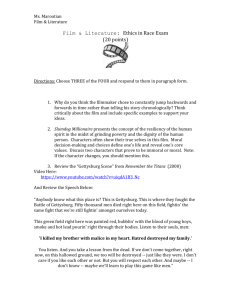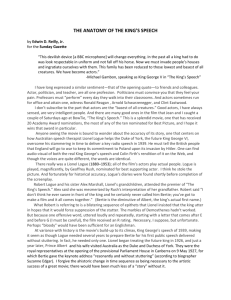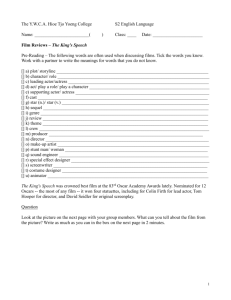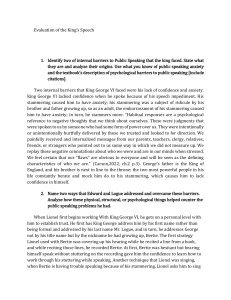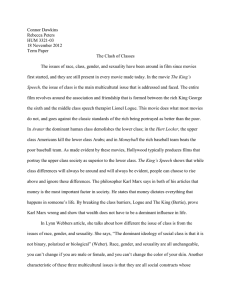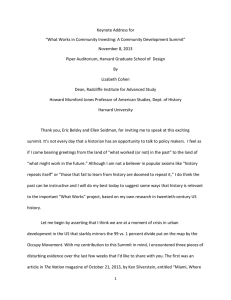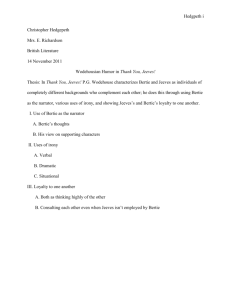WARM UP –Sports, Entertainment &Marketing
advertisement
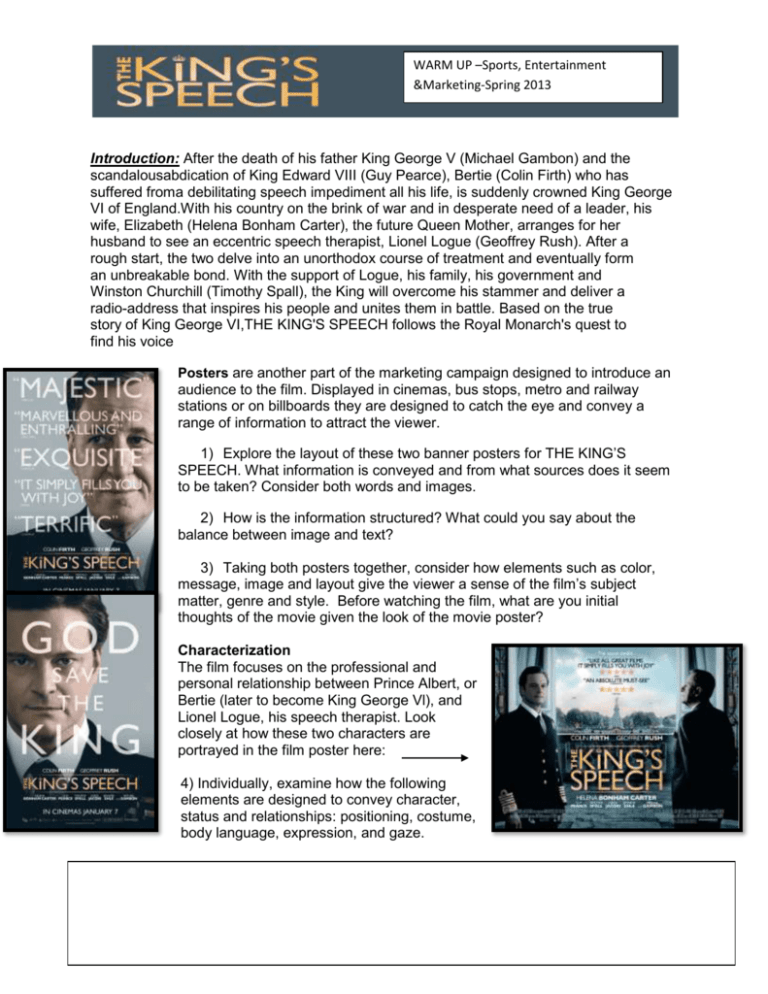
WARM UP –Sports, Entertainment &Marketing-Spring 2013 Introduction: After the death of his father King George V (Michael Gambon) and the scandalousabdication of King Edward VIII (Guy Pearce), Bertie (Colin Firth) who has suffered froma debilitating speech impediment all his life, is suddenly crowned King George VI of England.With his country on the brink of war and in desperate need of a leader, his wife, Elizabeth (Helena Bonham Carter), the future Queen Mother, arranges for her husband to see an eccentric speech therapist, Lionel Logue (Geoffrey Rush). After a rough start, the two delve into an unorthodox course of treatment and eventually form an unbreakable bond. With the support of Logue, his family, his government and Winston Churchill (Timothy Spall), the King will overcome his stammer and deliver a radio-address that inspires his people and unites them in battle. Based on the true story of King George VI,THE KING'S SPEECH follows the Royal Monarch's quest to find his voice Posters are another part of the marketing campaign designed to introduce an audience to the film. Displayed in cinemas, bus stops, metro and railway stations or on billboards they are designed to catch the eye and convey a range of information to attract the viewer. 1) Explore the layout of these two banner posters for THE KING’S SPEECH. What information is conveyed and from what sources does it seem to be taken? Consider both words and images. 2) How is the information structured? What could you say about the balance between image and text? 3) Taking both posters together, consider how elements such as color, message, image and layout give the viewer a sense of the film’s subject matter, genre and style. Before watching the film, what are you initial thoughts of the movie given the look of the movie poster? Characterization The film focuses on the professional and personal relationship between Prince Albert, or Bertie (later to become King George Vl), and Lionel Logue, his speech therapist. Look closely at how these two characters are portrayed in the film poster here: 4) Individually, examine how the following elements are designed to convey character, status and relationships: positioning, costume, body language, expression, and gaze. WARM UP –Sports, Entertainment &Marketing-Spring 2013 SPEECH-MAKING The speech which the King delivers at the end of the film was, in real life, delivered as a live radio broadcast in 1939. The broadcast was intended to help inspire people in the UK, overseas in the Empire and in the armed forces as Britain prepared to go to war. In the film, the King’s anxiety before he first speaks into the microphone is painful to watch: with the public listening, there was no room for re-recording errors or mis-readings. A recording of the actual 1939 speech, which is almost six minutes’ long, can be heard online: BBC Archive www.bbc.co.uk/archive/ww2outbreak/7918.shtml Listen carefully to the whole speech, then answer the questions below paying attention to the following aspects: Accent Choice of words Content Intonation Pace Pause 1) If you didn’t know the context for this speech, what clues could you draw on to tell you that this is a formal public speech, and one made in 1939 (as opposed to in the modern day)? 2) What could you say about the accent and pronunciation of the King? What style of English does he seem to use? 3) What elements of formal or informal speech can you identify here? 4) In what ways do you think that the King’s power, and also his humanity, come across in the speech? 5) What techniques does the king use here that might be helpful for anyone having to give a speech or a talk in public? 6) If you’ve ever had to speak publically, alone, for a similar length of time, you’ll know that speech-making is a skill that requires practise. In the film, THE KING’S SPEECH therapist Lionel Logue helps encourage the nervous king before he begins, saying ‘Forget everything else and just say it to me – say it to me, as a friend’. FINAL ACTIVITY: Create your own presentation covering the key points of good speechmaking, working examples of good techniques into what you say and how you say it. Make at least five key points, take care over your delivery and aim for a duration of 90 seconds minimum. WARM UP –Sports, Entertainment &Marketing-Spring 2013 Please answer below:




